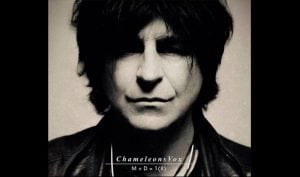MARK BURGESS / THE CHAMELEONS 2017 interview remembered…
The Chameleons singer/bassist, Mark Burgess will perform the seminal 80’s album Script Of The Bridge under the guise of Chameleons Vox at The Echoplex on Sep. 10.
For long-time Chameleon’s fans, this is a do-not-miss evening of cherished songs such as “Less Than Human,” “Don’t Fall” and “Second Skin” to be performed by the man who penned them.
In the early 80’s UK music scene, The Chameleons were critically compared to the likes of The Cure and Joy Division. But as time has shown, their unique sound and thought-provoking lyrics stand on their own merits.
Concert Guide Live asked Burgess to talk about the early days of the debut album, the importance of a good shower and the upcoming live dates.
CONCERT GUIDE LIVE: What do you like about playing in SoCal?
MARK BURGESS: I’ve always enjoyed California, north and south, both performing and hanging out. I’ve always had a terrifically warm response, not just with Chameleons but with all the projects I’ve brought there. For me it’s always been a fresh and progressive environment. I find it very stimulating. San Francisco has long been one of my most favourite cities in the world.
CGL: What is it like to perform the first album, Script Of The Bridge in its entirety?
MB: We enjoy it for the most part, although I do still find it strange because an album’s running order is a very different dynamic from a live show. Our albums, especially Script, lend themselves well to it though because they were conceived like a journey from A-to-B, a beginning, a middle, an end with the pace of the songs a factor.
CGL: Why were the songs “Here Today,” “Less Than Human,” “Paper Tigers” and “View from a Hill” omitted in the original U.S. version? Will you be performing them?
MB: Yeah, we’ll be performing the album as it was meant to be heard. The cut version was nothing to do with us, that decision was made by MCA Records in the U.S. without any consultation or consent from the band. We were very, very upset by it.
CGL: Do you find it challenging to “connect” with a song in the same way when you’re singing and playing bass as opposed to just singing and being front man?
MB: No, not at all, because it’s the most natural way for me to perform. It was good from a vocals point-of-view to focus on that for a while, and, besides, my mate Ray was in the band and was a bass player and initially I didn’t want to see him go; eventually though I had to, because I was keen to get back to playing the music with the feel it was meant to have. That was sad for me, but it was either that or leave the band and start another.
CGL: What continues to stick out in your mind when you think back to recording this album?
MB: I think it was just the great time that we had doing it. I mean we should have been really depressed, I suppose. Steve Lillywhite had passed on producing it, CBS had fired us and we were, to all intents and purposes, right back where we started, but we weren’t at all. We were making the record we wanted to make with no compromises. Ideas were flying around, we were laughing a lot and making a great record and we all felt it. I think it was the best time to be in the band on reflection.
CGL: Working with producer Colin Richardson seems like an interesting choice since he is mostly associated with heavy metal music, but, oddly, he seems to have had a real affinity for The Chameleons. What was it like working together and how did this relationship come about?
MB: Well, Colin was the resident engineer at Cargo so we’d worked with him on nearly all the demos we’d recorded there. He liked the band and the music so it was just a natural choice. He understood the music and how we worked and we admired him for the same reasons. At the time he worked on whatever came through the studio. He wasn’t known for any one particular genre, just known for being a very good engineer.
CGL: The Chameleons popularity has grown over the years far beyond any commercial success the band achieved during its initial run. Are you ever surprised at the acclaimed status your music has taken on?
MB: Yeah, I mean it was a surprise. I was more aware than the others I think because I was the first to get on to the Internet when hardly anyone else even knew what it was back in the early 90’s. I found a mailing list run out of Berkeley and an ftp site with my lyrics, gig fliers and stuff. That was a pleasant surprise. Then later with various re-releases and then the huge reaction to the reformation gigs in 2000; but at the time I never honestly imagined people would want to hear me perform this material some 30 years later or whatever. I didn’t envision that at all.
CGL: As a final question, do you have any pre-show routines/rituals?
MB: I need to take a good shower before a show. I mean, I start the working day with one, usually in a hotel or motel, but the pre-show shower is something different. It’s nothing to do with hygiene, it just helps clear my mind and feel fresh for the stage. Some of the smaller venues don’t have them of course and quite often it’s a mad dash across town or whatever to wherever I’m staying so I can do it. I get quite grumpy if I can’t take a shower before a show.
